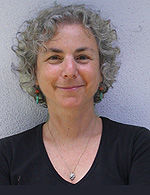is how roomy it is. How you can take a moment and stretch it like a cat stretches, her loose spine arching, how she splays her paws, each padded toe and its keratin claw. Yesterday, the child picked up the photo of our dead cat, lambent eyes shining out from all that black fur. She stroked the sparkles we glued onto the frame. Though the cat began as metaphor there’s space in the poem for her and for the child. And how before the girl is grown, she’ll be holding my photo. That and whatever memories I’ve pressed into her like a seal into wax. You can open a poem like a box, cardboard or casket or the jewelry box I had as a girl with the wind-up ballerina that held a little ring shaped like a butterfly that’s still somewhere in the house. No one will want it when I die. Nor will they want the afghans my mother crocheted at night after the liquor store closed, each stitch perfectly even. Though I’ll leave the kids a note to be careful with the camel’s head Nicola gave me. She said it was from 300 B.C., the features softened by the centuries and so fragile, specks of clay flake off at a touch. On a shelf above my desk are the pages she typed: I spent the summer of 1949 at the Eastcoast of England...These surroundings of water, sun, rain and wind were helping to heal me of the pain...the death camps, the death of my father, my children, my friends, the unconfirmed death of my beloved husband. There’s room in a poem for this. But there’s also a chamber for the cherry tree Beverly and I once stood under devouring the warm fruit, glazed with the juices. In the last half century, she’s sent me chocolate cherries wrapped in gold foil, beaded cherries, salt and pepper cherries, cherry napkin holder, apron, dish towel, earrings, and collages of cherries. When we were very young we dropped acid and sat in a stream in Vermont and I heard god—or a voice that wasn’t mine—say nothing you could do would ever be wrong and I understood it meant making love with her. And in what other sphere could I introduce the fascinating fact that female praying mantises don’t eat the heads of the male—during sex or after. I met the scientist who researched this. He was handsome and I definitely wouldn’t have beheaded him either. I need poetry because how else could I preserve this ordinary morning, fog like a canvas on which the trees are painted in sublime green though the planet is angling into autumn. And the dahlias, like movie stars at the Oscars, in outrageous opulence, purples you could sink your teeth into, bursts of gold, feverish tongues of flame. And where but in a poem is there a place for that shop in southern Italy filled with every kind of olive that we tried to go back to, but could never find again. Or the last time we stayed with Florence not knowing it was the last. Janet and I walked in Central Park as the wind blew yellow leaves down in such profusion it was almost like snow and as night came on we carried plastic bags of miso soup and sushi and ate looking out at the little squares of light in all the buildings, each with a life--with lives--behind them. And what else to do with the ivory letter opener I bought sixty years ago in Nairobi before I knew such things were souvenirs of a massacre. I flew there consumed with desire for a man I’d known for three days. When I meet him again decades later, we drink espresso martinis and say goodnight in the hotel lobby, though I want to follow him to the elevator and ride to whatever floor exists that would let us rise up out of our lives for an hour, for a night, for a time when there is no time which is what the physicists now tell us. What but a poem could bear all the longing and all the loss. Those nights when my sorrow pushed against the walls and doors and I’d go out to the garden in my white satin robe, bending to the iris and the Peruvian lilies, crushing the snails, my fingers sticky with their slime. Those days I didn’t want to die, exactly. Just, I didn’t much care if I lived. The poem will carry that. And it will carry what came after. Walking with my son along the streets of Paris. We’re just off the plane, jet-lagged and giddy, and the sun shining down like it didn’t have a thing to do but give us pleasure. The poem is generous. The poem will hold it all, will hold it even after I am dead. Even if it’s not a good poem. Even if almost no one will read it. Even when the few who read it are dead too. Still the poem will hold it a little longer. The poem will hold it forever. Because I will speak the poem aloud. I’ll send the sound waves out into the air. And like the static that remains from the beginning of the universe, my rambling poem will be breathed out into space and however modest, however miniscule the trace, it will not—none of it will—absolutely utterly disappear.
